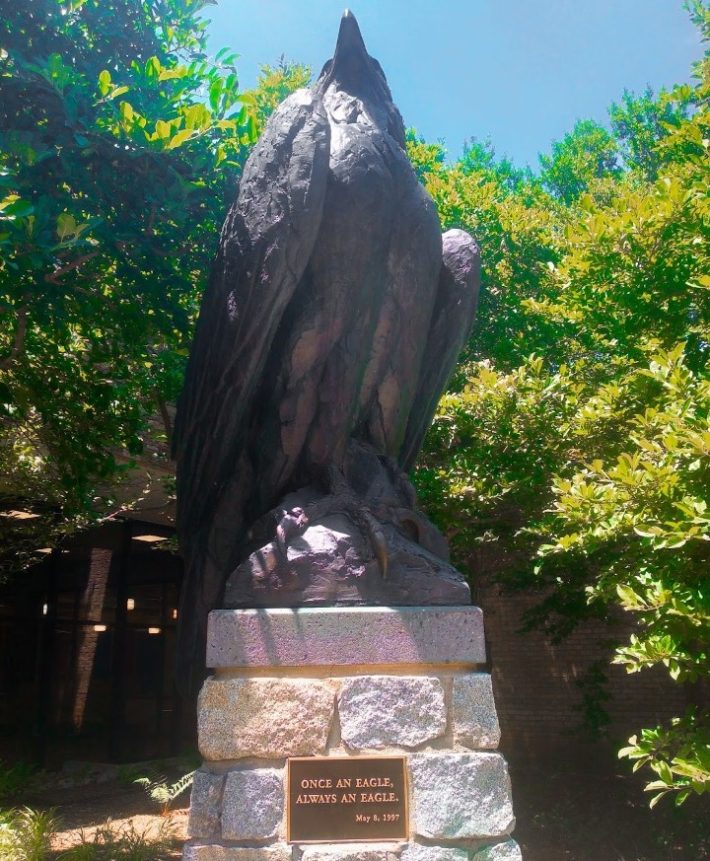By Delaney Murphy
Students at American University often feel the effects of the school’s proximity to important events, which can have both positive and negative impacts on their lives and education in Washington, D.C.
One political science and international studies student at AU, Evelyn Middleton, decided to attend the school in part because of its location near political activity. However, she said that she sometimes feels unsafe living in the district during times of conflict.
“I remember, when Russia had started bombing Ukraine…there were bomb threats at the Russian embassy, which is not super far from here,” Middleton said. She recalled that family members had texted her to ask if she was okay at the time. Middleton also said that, because AU is not in the middle of Washington, she feels as though the school is a bit safer in comparison to other campuses in the area.
AU’s location near political events also affects the university’s academics and class material. Middleton described one of her classes that discussed the war between Russia and Ukraine as part of the curriculum, and said that the inclusion of current events in the course caused her stress.
“Sometimes it’s hard to feel like you’re getting the education you want when, in reality, people want to discuss current events,” Middleton said.
Attending school in the district has also made Middleton somewhat accustomed to remarkable events.
“It’s another Tuesday in D.C.,” Middleton joked after explaining how her parents worried about her in the wake of major developments. “But, I think I’m still getting used to it, and I think I probably will become more desensitized as I continue going to school here.”
Another American University student who has felt the impact of living close to the Capitol is Chris Chung, a law student who, like Middleton, was drawn to AU because it was the best place for his major. Chung described the experience of living so close to major events as “surreal.”
“I’ve always followed politics, but…it’s one thing when you’re following politics just on the news. It’s another thing when it’s down the street from you,” Chung said.
Despite the events that sometimes take place in Washington, Chung has never considered the district to be dangerous in itself.
“I don’t necessarily think that I consider D.C. unsafe, or being close to the action unsafe,” Chung said. “I think every city has its violence, every town has its violence. There are times when stuff happens in D.C., and I’ve been in closer proximity to it, but I don’t think I’ve inherently ever felt unsafe because of D.C. specifically.”
Although Chung has never felt unsafe in Washington due to its proximity to the action, he has been in a situation in which he needed to prepare for possible conflict in the district.
“I specifically remember, for Joe Biden’s inauguration, there were talks about whether there would be a second insurrection.” Chung said. “Me and my roommate…had a plan for leaving our area of D.C. and a plan for leaving the city.” Chung had never felt the need to prepare for something like that before, and said the experience was a lot to take in.
Despite the occasional need to prepare for dangerous circumstances, Chung expressed that living in Washington has a lot of positives for him. He explained that he enjoys living in a city that has much more diversity than his hometown, which is predominantly white.
“When you’re not as big of a voice, it’s hard to get other people to hear you,” Chung said, describing where he grew up. He said that he appreciates that people of color have more of a voice in Washington than he was used to at home, given the district’s diverse makeup.
News flows constantly in Washington, and the continuous influx of information has affected students like Middleton and Chung. Professor Anthony Ahrens, the chair of the psychology department at American University, described the influence of news coverage on the mind.
“I recall some data about watching local nightly news programs increasing one’s estimate of how common crime is.” Ahrens said, specifying that everything he knows about this topic is speculation. “If something is easier to call to mind, we think it more common, and the news can make it easier to call things to mind.”
Ahrens explained that human biases can impact how people perceive events.
“We estimate frequency in part by the availability heuristic,” Ahrens said. The availability heuristic, or availability bias, is the tendency to overestimate the frequency of things that come to mind most readily. Although things like widely covered news stories are the first things to come to mind when thinking about certain issues, that may not reflect how often these types of things actually happen.
AU students who feel stressed about current events have a few on-campus options they can turn to if they feel that they need help, according to Ahrens.
“Some resources are the student counseling center and the Kay spiritual life center,” Ahrens said.
